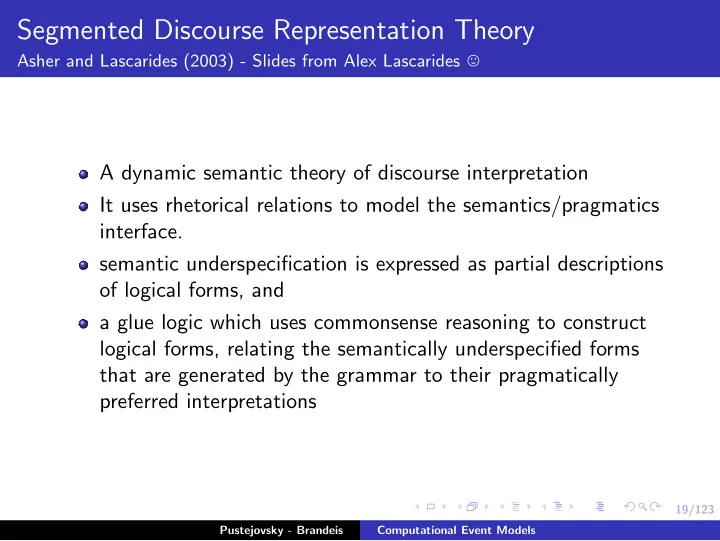

Segmented Discourse Representation Theory Asher and Lascarides (2003) - Slides from Alex Lascarides � A dynamic semantic theory of discourse interpretation It uses rhetorical relations to model the semantics/pragmatics interface. semantic underspecification is expressed as partial descriptions of logical forms, and a glue logic which uses commonsense reasoning to construct logical forms, relating the semantically underspecified forms that are generated by the grammar to their pragmatically preferred interpretations 19/123 Pustejovsky - Brandeis Computational Event Models
The Need for Rhetorical Relations: Data 21/123 Pustejovsky - Brandeis Computational Event Models
The Need for Rhetorical Relations: Data 22/123 Pustejovsky - Brandeis Computational Event Models
The Strategy 23/123 Pustejovsky - Brandeis Computational Event Models
Logic of Information Content: Syntax 24/123 Pustejovsky - Brandeis Computational Event Models
SDRSs allow Plurality 25/123 Pustejovsky - Brandeis Computational Event Models
A Diagram 26/123 Pustejovsky - Brandeis Computational Event Models
Example 27/123 Pustejovsky - Brandeis Computational Event Models
Other Ways of Showing This 29/123 Pustejovsky - Brandeis Computational Event Models
Availability: You can attach things to the right frontier 30/123 Pustejovsky - Brandeis Computational Event Models
Improvement on DRT: The Dansville Example 31/123 Pustejovsky - Brandeis Computational Event Models
Semantics: Veridical Relations - Speech Acts 32/123 Pustejovsky - Brandeis Computational Event Models
Defining φ R ( α,β ) for various R 33/123 Pustejovsky - Brandeis Computational Event Models
Defining φ R ( α,β ) for various R 34/123 Pustejovsky - Brandeis Computational Event Models
Recommend
More recommend